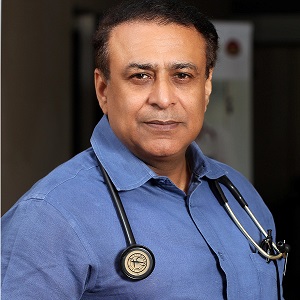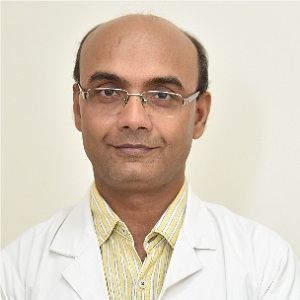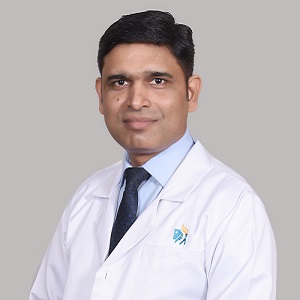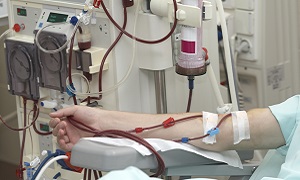Best Doctors in India for Glomerulonephritis Treatment
- Top Nephrologist | Apollo Hospital, New Delhi, India
- 22 Years Experience
- Indraprastha Apollo Hospital, New Delhi
Profile Highlights:
- Dr. Sanjiv Jasuja is a Nephrologist & Transplant Physician at the Indraprastha Apollo Hospitals, Sarita Vihar, and at Apollo Hospitals, Noida. Along with an MBBS, his educational qualifications include an MD in Medicine, a DNB in Nephrology, and an MNAMS in Nephrology.
- His 22 years of medical practice are highlighted by his memberships in various prestigious national and international medical societies including the Indian Society of Nephrology, Indian Society of Organ Transplant, Indian Society of Critical Care, Indian Society of Clinical Research, International Society of Nephrology, and European Dialysis & Transplant Society.
- Dr. Sanjiv Jasuja maintains a dedicated medical practice which is evident by his busy schedule in switching between the two branches of Apollo Hospitals, which he manages efficiently. Due to his firm hand and calm demeanor during operations, he has earned a respect among his patients which is evident by his high patient satisfaction rate.
- Top Nephrologist | Apollo Hospital, New Delhi, India
- 20+ Years Experience
- Indraprastha Apollo Hospital, New Delhi
Profile Highlights:
- Dr. Kailash Nath Singh is one of the best Nephrologists working in New Delhi.
- Dr. K.N. Singh is currently working as a leading Senior Consultant in Nephrology & Multi-Organ Transplant unit at Indraprastha Apollo Hospital, New Delhi, India.
- He has also been felicitated recently by his Holiness “DALAI LAMA” for his excellent work in Kidney Transplants.
- Nephrologist, Gurugram, India
- Over 20 years’ experience
- Artemis Hospital, Gurgaon
Profile Highlights:
- Dr. Shashidhar Shree Niwas is a well-known nephrologist in Delhi/ NCR with expertise in nephrology, dialysis, kidney disease, and transplantation.
- He has many National as well as International publications to his credit. Some of his national publications include ‘Acute Kidney Injury in HIV positive Patients’, ‘Coronary Artery Disease in Diabetes Mellitus’ etc. His paper on ‘Acute Kidney Injury in Developing Countries’ was published in a very prominent international journal.
- Nephrologist, Gurugram, India
- Over 25 years’ experience
- Artemis Hospital, Gurgaon
Profile Highlights:
- Dr. Lakshmi Kant Tripathi throughout his career has supervised around 54000 hemodialyses at different centers in Delhi NCR, with great clinical outcomes.
- He is successfully engaged in kidney transplantations, including Incompatible & High-risk ones. He is a specialist in managing Resistant hypertension, difficult-to-treat Nephrotic Syndromes, Complicated UTIs & high-risk Transplants.
- Nephrologist, Gurugram, India
- Over 40 years’ experience
- Artemis Hospital, Gurgaon
Profile Highlights:
- Dr. Manju Aggarwal is one of the leading nephrologists in India and has many years of experience in Nephrology at some of the best medical institutions including the University of Minnesota.
- She has expertise in treating critically ill patients with acute and chronic renal failure and those on dialysis and renal transplant.
- Dr. Aggarwal is also experienced in managing difficult and high-risk renal transplants, especially for those who need desensitization.
- Nephrologist, New Delhi, India
- Over 22 years’ experience
- Max Super Specialty Hospital, Saket, New Delhi
Profile Highlights:
- He has served as Director of Nephrology & Renal Transplant Medicine at Max Healthcare and was previously the Director & HOD at Fortis Memorial Research Institute.
- Dr. Saurabh Pokhariyal is a distinguished nephrologist with a comprehensive background in nephrology and renal transplant medicine.
- He earned his MBBS, MD (Internal Medicine), and DNB in Nephrology from GSVM Medical College, Kanpur, and Sanjay Gandhi PGI, Lucknow, respectively.
- Nephrologist, Gurugram, India
- Over 18 years’ experience
- Medanta-The Medicity, Gurgaon
Profile Highlights:
- Currently working as Associate Director, Nephrology at Medanta, Gurugram; Dr. Jha has several years of rich experience in his field.
- His area of expertise is renal transplantation, hemodialysis, chronic kidney diseases, and acute kidney injury. Throughout his career, he has treated thousands of patients from all over the country and also provides his patients with the best medical care.
- Dr. Jha completed DNB Nephrology from Manipal Hospital; Bengaluru in 2011. He has wide experience in pre as well as post-transplant care.
- Top Nephrologist | Max Hospital, Saket, New Delhi, India
- 23+ Years Experience
- Max Super Specialty Hospital, Saket, New Delhi
Profile Highlights:
- With over 23 years of experience in the field of nephrology, Dr. Alka Bhasin is a distinguished expert currently serving at Max Healthcare.
- Dr. Bhasin’s educational background is impressive, with a Fellowship in Nephrology from Thomas Jefferson University Hospital in Philadelphia, PA, USA (1998-2000), and a Residency in Internal Medicine at Mayo Clinic Rochester, Minnesota, USA (1996-1998).
- Top Nephrologist | Rela Hospital, Chennai, India
- 14+ Years Experience
- Dr. Rela Institute & Medical Centre
Profile Highlights:
- Dr. Jagdish K is currently designated as the Senior Consultant of Nephrology with a vast experience of 14 years.
- Dr. Jagdish K is well versed in Temporary Haemodialysis Catheters, Bone Marrow Aspiration and Biopsy, Lumbar Puncture, Arterial Lines, and Renal Biopsy.
- His special interests lie in Glomerulonephritis, Extracorporeal treatments, Post-Transplant Infections, and Renal Transplants across blood groups and in highly sensitized individuals.
- Top Nephrologist | Apollo Hospital, New Delhi, India
- 22+ Years Experience
- Indraprastha Apollo Hospital, New Delhi
Profile Highlights:
- Dr. Jayant Kumar Hota is a Nephrologist/Renal Specialist based in Sarita Vihar, Delhi having an experience with 22 years in this field.
- Dr. Jayant Kumar Hota practices at Indraprastha Apollo Hospitals, Delhi. He completed his MBBS from Utkal University in 1999, MD – Medicine from Banaras Hindu University in 2005, and DM – Nephrology from Rajasthan University of Health Science, Jaipur in 2009.
- He is a member of Indian Society of Nephrology (ISN). Some of the services provided by the doctor include Kidney Disease Treatment, Hemodiafiltration (HDF), Kidney Dialysis, Laparoscopic Nephrectomy, Ureteroscopy (URS), etc.
Best Hospitals in India for Glomerulonephritis Treatment
- City: New Delhi, India
Hospital Highlights:
- Equipped with 650 beds, BLK-Max Super Speciality Hospital is the largest stand-alone private sector hospital in Delhi.
- With over 1500 healthcare providers and 150 globally renowned super specialists, the hospital is one of Asia’s largest BMT Centres. The hospital is known for having some of the best cancer doctors in the country.
- The hospital is NABH and NABL accredited and was inaugurated by the first Prime Minister of India. Pt. Jawahar Lal Nehru.
- City: Hyderabad, India
Hospital Highlights:
- Located in the vibrant city of Hyderabad, Apollo Health City is a world-renowned medical facility that provides outstanding care and treatment to patients coming from different parts of the world.
- Founded in 1988, this 550-bed multispecialty hospital with 50 specialties and 12 Centres of Excellence continues to deliver outstanding outcomes for patients with the simplest to the most complicated medical conditions.
- Backed by the latest medical equipment and a dedicated team of professionals, the hospital provides comprehensive treatment across various specialties including, cardiology, critical care, neurosciences, cancer, orthopedics, gynecology, ENT, transplants, gastroenterology, etc.
- Apollo Health City is a cutting-edge healthcare facility that combines various facilities under one roof. These may include state-of-the-art physical medicine, rehabilitation, and wellness services with education, research, telemedicine, innovative medical devices, disease management programmes, and medical talents.
- The hospital is known for offering top-notch cancer treatment accompanied by cutting-edge facilities and technology.
- The hospital also offers a broad spectrum of cosmetic procedures that improve not just appearance but also comfort.
- In 2011, Apollo Health City was the recipient of the Asian Hospital Management Award (AHMA).
- In 2013, the Government of India recognized Apollo Health City as the top medical tourism destination in the country.
- City: Mumbai, India
Hospital Highlights:
- Kokilaben Dhirubhai Ambani Hospital, Named after the wife of Indian industrialist Dhirubhai Ambani, the founder of Reliance Industries, this is one of the top hospitals in Mumbai. This 750-bed multi-specialty hospital became operational in 2009. Known as one of India’s most advanced tertiary care facilities, the hospital is designed to raise India’s global standing as a healthcare hub, with an emphasis on excellence in clinical services.
- Kokilaben Dhirubhai Ambani Hospital uses Protocol and Care Pathway based treatment models to ensure the best outcomes for patients.
- The hospital represents a confluence of top-notch talent, cutting-edge technology, state-of-the-art infrastructure, and, most importantly commitment.
- The hospital also holds the accreditation of the NABH, NABL, CAP, and JCI.
- The hospital has been recognized as the No. 1 Multispecialty Hospital in Mumbai and the West Zone for the fifth year in a row in 2020 by The Week.
- City: Chennai, India
Hospital Highlights:
- Apollo Cancer Centre in Teynampet, Chennai is one of the best super speciality hospitals in India. It is the country’s first ISO-certified healthcare facility.
- Additionally, it is the first hospital in Chennai and the first oncology hospital in India to receive NABH accreditation.
- The hospital provides advanced tertiary care in oncology, orthopedics, neurology and neurosurgery, head and neck surgery, and reconstructive and plastic surgery.
- Additionally, it offers specialized healthcare of international standards with results comparable to those of the best hospitals in the world.
- It is outfitted with 300 beds, the newest and greatest technology, a large pool of highly qualified specialists, and a committed team of medical and paramedical professionals.
- It is one of the first few medical facilities in India to offer comprehensive cancer care. A team of skilled medical, surgical, and radiation oncologists makes up the Tumour Board, which is a component of the complete treatment planning system. After reviewing reported cases, the Board determines in concert with diagnostic specialists what course of action is best for each individual patient. The panel is further supported by dieticians, medical counselors, speech therapists, and other pertinent specialists.
- The hospital launched the first ExcelsiusGPS® Spine Robot in South India and has completed over 50 surgeries till date.
- It is also one of the few cancer hospitals in India to offer Cyber Knife therapy. Till now it has completed 1320 Cyber Knife therapies.
- The institution is also one of the few in India with the capacity to do transplants and find a prospective unrelated donor. The hospital has performed over 1000 BMTs till now.
- Furthermore, it has an exceptional milestone of performing exultant Micro vascular free tissue transfer and Aesthetic surgeries on more than 1000 patients with success.
- City: Chennai, India
Hospital Highlights:
- Apollo Hospitals, Chennai, is one of the best hospitals for heart care in India. Over the years, Apollo has expanded all over India, as a healthcare chain.
- India’s first ‘Only Pancreas’ transplant was performed in Apollo Hospital. The hospital is known for successfully performing Asia’s first en-bloc combined heart and liver transplant, and over the years, it has attained a remarkable achievement in the global healthcare space. Around 3-4 organ transplants are performed in the hospital per day.
- Equipped with over 500 beds, this hospital in Chennai was established in 1983 and since then has been among the most preferred hospital for patients from all over the world.
- The hospital holds accreditation of the NABH and JCI and is the first hospital in India to be ISO 9001 and ISO 14001 certified. It is also the first South Indian Hospital to receive subsequent reaccreditation from the JCI USA 4 times.
- City: Chennai, India
Hospital Highlights:
- Established in 1999, Gleneagles Global Hospital, Chennai, is one of the top healthcare facilities in Southern India. It is part of the Gleneagles Hospital Chain, which is the fourth largest healthcare chain in the country. The hospital specializes in multi-organ transplants of kidneys, liver, lungs, heart, etc.
- The hospital has an excellent infrastructure and state-of-the-art lab and equipment set-up. The hospital boasts cutting-edge technologies, a highly skilled team of doctors and surgeons, and trained support staff. Located in Perumbakam, Chennai, it is one of India’s premier health care destinations. The hospital has performed some of the most complex surgical and clinical procedures in India including multi-organ transplantations.
- The hospital’s lung transplantation program is one of the best in the country. The hospital is known for having performed India’s first single lung transplant and first minimal invasive lung transplant. It is also the only Indian hospital to be associated with King’s College Hospital, London, United Kingdom for liver transplantations.
- City: Hyderabad, India
Hospital Highlights:
- KIMS Hospital (a brand name of Krishna Institute of Medical Sciences) is one of the largest and best multi-speciality hospitals in Hyderabad. The hospital provides various treatments to an enormous number of patients.
- The hospital has a capacity of more than 3000 beds. KIMS Hospitals offers different healthcare services in more than 25 specialities and super specialities.
- The hospital is equipped with modern medical equipment and technology. It has robotic equipment to provide minimal invasive techniques for patients.
- The hospital is aimed at providing world-class healthcare facilities and services at an affordable cost for patients.
- The various specialities and departments of the hospital include neurosciences, gastroenterology & hepatology, robotic science, reproductive sciences, dental science, oncological sciences, organ transplantation, heart and lung transplantation and mother and child care.
- City: Kolkata, India
Hospital Highlights:
- Established in 2003, Apollo Gleneagles Hospitals is a 750-bed multispecialty tertiary care hospital situated in Kolkata.
- With 33 Centres of Excellence and more than 50 specialties, Apollo Gleneagles Hospitals, Kolkata is capable of handling all sorts of patients.
- This tertiary care hospital, which is a 100% subsidiary of Apollo Hospitals Enterprise Ltd., India, is regarded as one of Kolkata’s top hospitals.
- The facility is a complete blend of cutting-edge technology, state-of-the-art infrastructure, and genuine hospitality.
- Focusing on numerous specialties, the hospital provides all-inclusive medical treatments supported by cutting-edge technology and a staff of highly qualified medical specialists.
- Patients across the globe come to Apollo Gleneagles Hospitals Kolkata for their treatment. Moreover, international patients receive full attention and assistance for their treatment and are provided with a hassle free experience.
- Apollo Gleneagles Hospitals, Kolkata is the only hospital in Eastern India to hold the Joint Commission International (JCI) certificate.
- It is also the only hospital in Kolkata to hold the NABL accreditation in six different categories, which includes Clinical Biochemistry, Clinical Pathology, Hematology & Immunohematology, Microbiology & Serology, and Histopathology & Cytopathology.
- Furthermore, Apollo Gleneagles Hospitals, Kolkata is known for performing the first ever Reverse Shoulder Prosthesis Replacement in East India.
- City: Bengaluru, India
Hospital Highlights:
- Established in 1991, Manipal Hospital, Old Airport Road, Bangalore is the flagship facility of the Manipal Hospitals Group, which is one of the largest networks of Multispecialty Private Hospitals in India.
- The facility is well-known for its state-of-the-art technology, performance-driven, patient-centric, and evidence-based approach.
- The facilities offered at Manipal Hospital meet the highest international standards, allowing the hospital to attract a large number of national and international patients.
- Their expertise encompasses the diagnosis and treatment of a wide range of diseases in several specializations that address both simple as well as complex medical procedures.
- There are total 600 beds accessible in the hospital for the in-patients so they may heal while being closely watched after by the medical team. In addition, it has 144 critical care units, including NICUs, ICCUs, and ICUs. Apart from that, the hospital also offers 20 contemporary, modular state-of-the-art operating rooms with all the amenities needed.
- The hospital has several departments that are overseen by highly skilled, certified, and experienced medical experts.
- One of the best departments in the hospital is that of the Cancer department which is known for its advanced cancer diagnosis and treatment facilities such as Intracavitary Chemotherapy, Biological Therapy, HIPEC, PIPEC, Nuclear Medicine, Radiation Therapy, etc.
- It is one of the few hospitals in Bangalore that provides full range of pediatric services, including pediatric emergency services, pediatric gastroenterology, pediatric neurology, pediatric cardiology, pediatric orthopaedics, pediatric allergies, pediatric immunology, and infectious diseases.
- Furthermore, Manipal Hospital, Old Airport Road, Bangalore is also regarded as one of the best hospitals for bone and spine related disorders.
- City: Mumbai, India
Hospital Highlights:
- Established in 2016, Apollo Hospitals, Navi Mumbai is one of Maharashtra’s most advanced multispecialty hospital. This 500-bed hospital provides sophisticated treatments and integrated super specialty services under one roof.
- The hospital features a cutting-edge infrastructure that houses 13 state-of-the-art operating rooms, advanced laboratory and medical diagnostics, and 120 ultra-modern I.C.U. beds, including N.I.C.U. and P.I.C.U., monitored round the clock by critical care specialists.
- With 57 specialties and subspecialties, the hospital boasts a team of renowned medical specialists who offer accurate diagnosis and treatment with easy accessibility to their patients.
- Additionally, the hospital offers highly customized, individualized health check programs that are made to fit each person’s needs in terms of lifestyle.
- Apollo Hospitals, Navi Mumbai has been accredited by both the National Accreditation Board for Hospitals and Healthcare Providers (NABH) and the Joint Commission International (JCI).
- Apollo Hospitals Navi Mumbai has been awarded the “Best Practices-International Services Award” at the annual awards for service excellence and operations excellence.
Glomerulonephritis
Glomerulonephritis is a condition where the tiny filters in your kidneys, i.e. glomeruli, get inflamed. Glomeruli help you to remove excess fluid and waste from your bloodstream, which is then passed into your urine. This condition can come on suddenly or develop gradually. Both types may be fatal.
Glomerulonephritis can occur on its own or sometimes it may be a complication of another disease such as diabetes or lupus. Your kidneys can get damaged if there is severe or prolonged inflammation caused by glomerulonephritis. Therefore, early diagnosis and treatments are quite important.
Symptoms
Symptoms that you experience usually depend on what type of glomerulonephritis you are having and the severity of the condition.
Symptoms of acute glomerulonephritis include the following:
- Puffiness in your face
- Extra fluid in your lungs, which can lead to coughing
- Urinating less often
- Blood in your urine
- High Blood Pressure
The chronic form of glomerulonephritis can sometimes occur without any symptoms. There might be slow development of symptoms that are similar to the acute form. Some of the symptoms include the following:
- Blood or excess protein in your urine, which may be microscopic and show up in urine tests
- High blood pressure
- Pain in the abdomen
- Frequent nosebleeds
- Swelling in your ankles and face
- Frequent nighttime urination
- Bubbly or foamy urine, caused by excess protein
In some cases, your glomerulonephritis might get so advanced that it can lead you to develop kidney failure. Some of the symptoms of this can include the following:
- Fatigue
- Lack of appetite
- Nausea and vomiting
- Insomnia
- Muscle cramps at night
- Dry and itchy skin
Causes
Several conditions can lead to glomerulonephritis. The disease is also sometimes known to run in families. In other cases, the disease may be unknown.
The following causes can lead to inflammation of the glomeruli:
Post-streptococcal glomerulonephritis- Glomerulonephritis can develop some days after you recover from a strep throat infection or, in rare cases, a skin infection. To combat the infection, your body is going to produce extra antibodies that may eventually settle in the glomeruli, and lead to inflammation.
This type of glomerulonephritis is more common among children than adults. But they are also likely to recover more quickly.
Bacterial endocarditis- Bacteria can spread occasionally through the bloodstream and lodge in your heart, leading to an infection of one or more of your heart valves. If you have a heart defect, such as a damaged or artificial heart valve, then you are at a greater risk. Bacterial endocarditis is associated with glomerular disease, though the connection between the two is still unclear.
Viral infections- There are several viral infections, such as the human immunodeficiency virus (HIV), hepatitis B, and hepatitis C, which can also cause glomerulonephritis.
Goodpasture’s syndrome- This is a rare immunological lung disorder that is similar to pneumonia. Goodpasture’s syndrome leads to bleeding in your lungs as well as glomerulonephritis.
Lupus- This is a chronic inflammatory disease, which can affect many parts of your body, such as your joints, skin, blood cells, heart, kidneys, and lungs.
IgA nephropathy- This condition is characterized by recurrent episodes of blood in the urine. This primary glomerular disease is a result of deposits of immunoglobulin A (IgA) in the glomeruli. IgA nephropathy can progress for years without any noticeable symptoms.
Polyarteritis- This is a form of vasculitis which affects small and medium blood vessels in several parts of your body, like your heart, kidneys, and intestines.
Granulomatosis with polyangiitis- This form of vasculitis, which is formerly known as Wegener’s granulomatosis, can affect small and medium blood vessels in your lungs, upper airways, and kidneys.
High blood pressure- High blood pressure can damage your kidneys and impair their ability to function normally. Glomerulonephritis can also lead to high blood pressure since it reduces kidney function and can also influence how your kidneys handle sodium.
Diabetic kidney disease (diabetic nephropathy)- This can affect anyone having diabetes, generally taking years to develop. Good control of blood sugar levels and blood pressure can however prevent or slow kidney damage.
Focal segmental glomerulosclerosis- This condition is characterized by scattered scarring of some of the glomeruli, and it can result from another disease or sometimes occur for no known reason.
Infrequently, chronic glomerulonephritis also runs in families. One inherited form, Alport syndrome, may impair one’s vision or hearing.
Glomerulonephritis is associated with certain cancers as well, such as multiple myeloma, lung cancer as well as chronic lymphocytic leukemia.
Diagnosis
Glomerulonephritis is often detected during a routine urine analysis. Tests to assess your kidney function and for diagnosis of glomerulonephritis can include:
Blood tests
Urine test
Imaging tests
If your doctor detects evidence of damage, he/she can recommend a kidney X-ray, a CT scan, or an ultrasound exam.
Kidney biopsy
Treatment
Treatment is going to depend on several factors such as whether the condition is acute or chronic, the underlying cause, as well as the severity of the symptoms.
Medication
Glomerulonephritis after a strep infection should generally clear up without any treatment, though your doctor might prescribe antibiotics to kill the pathogens that are causing the infections. However, the patient will also likely need to reduce the intake of fluids as well as avoid food and drinks containing alcohol or high levels of protein, potassium, or salt.
Dialysis
Kidney transplant
A kidney transplant can be possible if the individual is healthy. However, for people who cannot undergo a transplant, dialysis is the only option.
Complications
Glomerulonephritis can cause severe damage to your kidneys, making them lose their filtering ability. Some of the possible complications of glomerulonephritis include:
High blood pressure- Damage to your kidneys and the resulting buildup of wastes in your bloodstream may eventually cause your blood pressure to rise.
Acute kidney failure– Loss of function in the filtering part of the nephron can lead to rapid accumulation of waste products. Due to this, you might require emergency dialysis, which is an artificial means of removing extra fluids and waste from your blood, using an artificial kidney machine.
Chronic kidney disease– In this condition, your kidneys lose their filtering ability. Kidney function that deteriorates to below ten percent of normal capacity results in end-stage kidney disease, which can require dialysis or a kidney transplant to help sustain life.
Nephrotic syndrome- With this syndrome, too much protein in your urine causes too little protein in your blood. Nephrotic syndrome may be associated with high blood cholesterol as well as swelling of your eyelids, feet as well as the abdomen.
Prevention
Although most forms of glomerulonephritis are not preventable, there are some ways to reduce the risk.
Some of the ways include the following:
- Seek medical attention if you have a strep infection causing a sore throat or impetigo
- Practice safe sex
- If you have blood pressure or diabetes, keep it in control
- Avoid the use of illegal intravenous drug as well as sharing needles
A healthy lifestyle with proper exercise, proper sleep, and a balanced diet can also help in reducing the risk of glomerulonephritis.



























